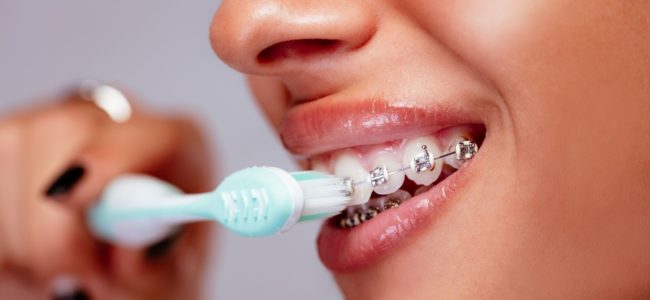Can Braces Ruin Your Teeth?
For decades, braces have been seen as a rite of passage during puberty. More adults are getting braces nowadays as well, adding to the number of people visiting their orthodontist on a regular basis. But along with this increase in braces, a lot of people have begun wondering about the long-term implications of braces and whether or not braces can ruin or damage teeth.
Oral Hygiene Is Key
Braces offer a number of excellent benefits. Not only do they offer a straighter smile, but they can also make dental hygiene much easier to come by as they minimize tooth overlap. But the main concern for many people considering braces is how the braces themselves will impact their oral hygiene and dental health. There are some risks and challenges to consider, but generally speaking, maintaining a good regimen of brushing twice daily, flossing once daily, and regular antiseptic mouthwash rinses are enough to keep your teeth and gums in optimal health.
However, as with anything, some people are simply prone to more difficulties when it comes to braces, oral hygiene, and dental health, so we’ve broken down the various risks and challenges you might face due to having braces.
Possible Risks and Challenges of Braces
Two primary concerns are associated with braces: gum health and demineralization. For the most part, good oral hygiene can minimize the concerns of both of these, but it is still important to know what possibilities lie ahead and how best to combat them.
Gum Health
This is the biggest long-term concern when it comes to braces. Because the braces cause your teeth to shift, there is stress on the bones and gums which can lead to inflammation, bone loss, and gum recession. Individuals may also experience gingivitis due to less-than-ideal dental hygiene during their braces treatment. Additionally, the metal on braces can sometimes be problematic. It can adversely affect bacteria accumulation that contributes to gum problems.
Demineralization
The bracket part of braces are glued to your teeth and will stay there for the entirety of your braces treatment. Upon removal of the braces, some people will have a spot on their tooth where the brackets were. This is generally a slight discoloration caused by demineralization, which is a breaking down of the enamel on the tooth. Demineralization happens faster when people consume sugary or acidic drinks and when they are not effective or consistent in their brushing habits.
Talk to Your Dentist
If you’re considering braces for yourself or a loved one, and you are concerned about your dental health during and after the braces treatment, it’s important to talk to your dentist and orthodontist. You’ll need to weigh your options and consider what your primary dental goals are. You can also take extra care to practice preventative measures and be extra diligent about oral hygiene while the braces are on, as this will reduce your likelihood of having future issues.
It’s important to note that most of these concerns and possible issues are more likely to occur after you’ve gotten your braces off, rather than while you have them. Additionally, most people will not experience any of these issues, although some may experience more than one. The best way to avoid dealing with any of these problems is to maintain good oral hygiene both while you have braces and after they’re gone. It’s also important to make sure your orthodontist and dentist are focusing on the function of your mouth as a whole rather than just the cosmetic appearance of your teeth. Shifting teeth too aggressively or too quickly heightens the risk for these issues, and it’s important that your orthodontist is focused on the overall health of your mouth first and foremost.
